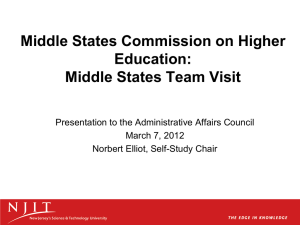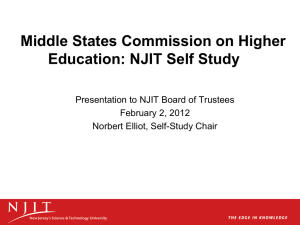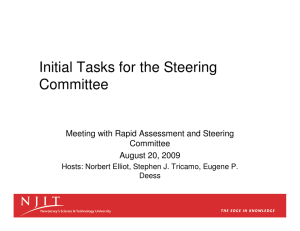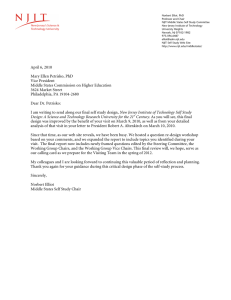I M OVING THE EDGE
advertisement
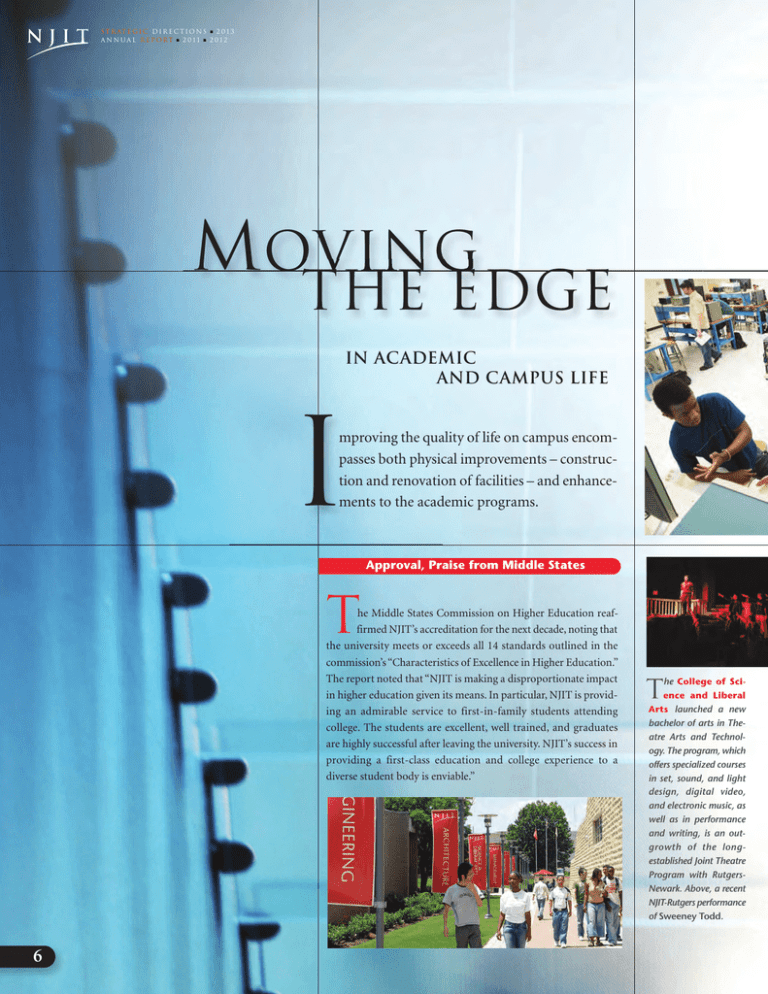
S t r at e g i c D i r e c t i o n s ■ 2 0 1 3 A N N UA L R E P ORT ■ 2 0 1 1 ■ 2 0 1 2 M OVING THE EDGE IN ACADEMIC AND CAMPUS LIFE I mproving the quality of life on campus encompasses both physical improvements – construction and renovation of facilities – and enhancements to the academic programs. Approval, Praise from Middle States T he Middle States Commission on Higher Education reaffirmed NJIT’s accreditation for the next decade, noting that the university meets or exceeds all 14 standards outlined in the commission’s “Characteristics of Excellence in Higher Education.” The report noted that “NJIT is making a disproportionate impact in higher education given its means. In particular, NJIT is providing an admirable service to first-in-family students attending college. The students are excellent, well trained, and graduates are highly successful after leaving the university. NJIT’s success in providing a first-class education and college experience to a diverse student body is enviable.” 6 he College of Sci- T ence and Liberal Arts launched a new bachelor of arts in Theatre Arts and Technology. The program, which offers specialized courses in set, sound, and light design, digital video, and electronic music, as well as in performance and writing, is an outgrowth of the longestablished Joint Theatre Program with RutgersNewark. Above, a recent NJIT-Rutgers performance of Sweeney Todd. S t r at e g i c D i r e c t i o n s A N N UA L R E P ORT ■ 2011 ■ 2013 ■ 2012 Building for the Future C ampus construction and renovation will add student housing, smart classrooms, and a new pedestrian mall. he Central King Building (formerly Central High School, right) is getting a much-needed face lift, including repair and replacement of masonry and brickwork, and new windows. Summit Street, closed to traffic from Warren to Bleeker Streets, is transformed into a tree-lined pedestrian mall. Internal improvements include smart-classroom technology, and new telecom and computer networks. The sculpture in the foreground is part of the “Art of Invention” exhibit created by Daniel A. Henderson, CEO of Intellect Wireless and member of the Board of Overseers. Moving the Edge in Learning Experiences NJIT round was broken for the Warren Street Village (above), an $80million project that will add 600 beds to the university’s inventory of student housing. Participating in the ceremonies were (left to right): Michael E. Smith ’95, Trustee Philip K . B e a c h e m , Te s s y Thomas ’12 , Carmel Pratt ’14 , Board Chair Kathleen Wielkopolski, President Joel Bloom , Trustee Stephen DePalma, ’72 , Monique King-Viehland, president of the Campus Gateway Development Corporation, Trustee Elizabeth Garcia, ’73, and Trustee Vincent De Caprio, ’72. Centerpiece of the project, due to open in fall 2013, is the Residential Honors College, (above left) as well as five three-story brick homes that will house 240 students in Greek organizations. ssistant Professor tall fabric glacier to complement a runway at Milk Studios near Lincoln Center in New York City, during Mercedes Benz Fashion Week 2012. G T takes learning beyond the classroom through innovative programs. A Brooks Atwood ’s industrial design students (left) had the unique opportunity to create, fabricate and install a 15-foot A S amantha Schulz (above, left) and Jabeen Ali (above, right) were among the industrial design students in Adjunct Professor Ran Lerner’s studio. Lerner, who runs a product design firm in New York, asked his students to create and build a prototype of a folding bicycle that could roll, maneuver, and fold. They were tested on the speed of folding and unfolding as well. sim Zamin (right) civil engineering major, leads a team of Honors scholars in developing a fuel cell that converts organic household waste into sustainable energy in the Interdisciplinary Design Studio at Albert Dorman Honors College, a unique, multiyear experience in entrepreneurship in which students take their ideas from design to commercialization. Interim dean of the Honors College, Atam Dhawan, received a grant from the National Collegiate Inventors and Innova- N tors Alliance to help support the program. JIT’s second TEDx event, focused on sustainability and featuring talks by leaders in the field, was held on campus this spring and simulcast to viewers worldwide. The TEDx programs bring together faculty and students to share their passion for innovation and sustainability. Above, Tony Sorgi, Honors scholar and biomedical engineering major, told the audience about his New Earth Archive program, a webbased resource for college students that identifies the most “powerful and influential books written about climate change, sociology, ecology, economics, technology, philosophy, and other topics that inspire college readers to change the world.” 7 S t r at e g i c D i r e c t i o n s ■ 2 0 1 3 A N N UA L R E P ORT ■ 2 0 1 1 ■ 2 0 1 2 A Full Spectrum of STEM Programs A s New Jersey’s science and technology university, NJIT offers programs based in science, technology, engineering and mathematics (STEM) at every level, from pre-college enrichment programs to teacher training to training for the long-term unemployed. H igh school teachers from urban school districts work in advanced pharmaceutical research laboratories and gain hands-on knowledge of particulate and composite systems to incorporate into their classroom teaching in the Research Experience for Teachers program. Directed by Kwabena Narh, professor of mechanical engineering, the program is sponsored by the Engineering Research Center on Structured Organic Particulate Systems. Above, Maria Aloia ’85, a teacher at Bayonne High School, has participated in the summer program for several years. G T ale Spak, associate vice president for continuing and distance learning, hosted Deputy Labor Secretary Seth Harris on a classroom tour when he came to campus to announce a $5-million grant to create a technical skills training program for northern New Jersey. NJIT’s Continuing Professional Education Division will take the lead in providing displaced and unemployed workers with education, training and job placement related to high-growth fields for jobs that are currently being filled by foreign workers. 8 heophilus Blount, business and information systems major and McNair scholar (left in photo below, right), took second prize in the Dana Knox Student Research Showcase for his design of a user interface for “A Participatory Learning Approach.” He was one of eight McNair scholars presenting research in the program, including Jay Vargas who took first prize and Frandy Dort, whose work placed third. NJIT’s McNair program is designed to help low-income and first-generation or under-represented students to complete their bachelor’s degree, and to go on to graduate studies and careers in academe or research. Funded by the U.S. Department of Education, the program is in its 12th year and has graduated 177 students. wenty teachers from across New Jersey formed the inaugural group for the newly-designed Medibotics distance learning training program. Designed to train middle and high school teachers to teach science and math through simulated robotic surgery, the successful classroom program has been able to expand its offerings to teachers throughout New Jer- T sey and across the U.S. via distance learning under a grant from ExxonMobil. Michael Ruiz and Cesar Figuroa of Jose Marti Middle School were members of the first classroom training group. Above, they work under the direction of Levelle Burton-Alexander (above standing), associate director of precollege programs. V eteran astronaut Bernard Harris, MD , (above) chats with students in the ExxonMobil Bernard Harris Summer Science Camp at NJIT. Harris, the first African American to walk in space, founded the camp six years ago to offer innovative programs to enhance the youngsters’ knowledge in science, technology, engineering and mathematics while encouraging them to stay in school and develop leadership potential and citizenship skills.
